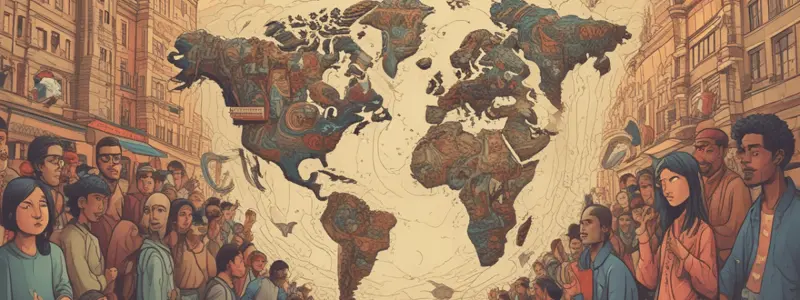Podcast
Questions and Answers
What is a primary concern for countries receiving immigrants?
What is a primary concern for countries receiving immigrants?
- Cultural and social integration of immigrants
- Maintaining global, social, and economical equality
- Pressure on job opportunities and welfare capabilities (correct)
- Promoting industrialization and economic growth
In what way can immigrants be beneficial to the receiving country?
In what way can immigrants be beneficial to the receiving country?
- By alleviating labor shortages and contributing to the workforce (correct)
- By creating social unrest and cultural tensions
- By increasing the population and strain on the economy
- By increasing competition for native-born citizens
What is a potential drawback of immigration for the sending country?
What is a potential drawback of immigration for the sending country?
- Increasing global, social, and economical inequality
- Promoting cultural exchange and diversity
- Reducing the population and strain on the economy
- Losing skilled workers and harming the future of the country (correct)
Why might countries exploit immigrant workers?
Why might countries exploit immigrant workers?
What is a potential issue that can arise when too many immigrants move to a particular area?
What is a potential issue that can arise when too many immigrants move to a particular area?
Why do people often migrate from their home country?
Why do people often migrate from their home country?
What is a common reason for biased immigration policies?
What is a common reason for biased immigration policies?
What did the Immigration Reform and Control Act of 1986 do?
What did the Immigration Reform and Control Act of 1986 do?
What has been the recent trend in some countries' immigration policies?
What has been the recent trend in some countries' immigration policies?
How has the European Union's immigration policy affected its economies?
How has the European Union's immigration policy affected its economies?
What is a major reason why transnational people move across borders?
What is a major reason why transnational people move across borders?
What is a common effect of globalization on immigration?
What is a common effect of globalization on immigration?
What is a consequence of immigration for the global economy?
What is a consequence of immigration for the global economy?
Why has immigration become more difficult since 2001?
Why has immigration become more difficult since 2001?
What is a common reason why people often migrate from their home country?
What is a common reason why people often migrate from their home country?
What is a primary motivation for transnational corporations to operate in multiple countries?
What is a primary motivation for transnational corporations to operate in multiple countries?
What is a potential consequence of biased immigration policies?
What is a potential consequence of biased immigration policies?
What is a unique aspect of the European Union's immigration policy?
What is a unique aspect of the European Union's immigration policy?
What is a common challenge faced by immigrants in their host countries?
What is a common challenge faced by immigrants in their host countries?
What is a global trend in immigration policies since 2001?
What is a global trend in immigration policies since 2001?
Flashcards are hidden until you start studying
Study Notes
Challenges of Immigration
- Immigrants face severe challenges when arriving in a new country due to conflicting desires to help others and fear of difference.
- The main issue is that the number of immigrants can put pressure on job opportunities and welfare capabilities of a country.
Effects of Immigration
- Immigration can be functional to the receiving country by alleviating labor shortages.
- Immigration can also be beneficial to the sending country by reducing population and relieving economic strain.
- However, immigration can also be dysfunctional, leading to exploitation of immigrants by countries seeking to maximize profits while ignoring global inequality.
Problems Caused by Immigration
- A sudden influx of immigrants can put pressure on social services in the receiving country.
- If too many skilled people leave a country, it can harm the country's future.
- Racism and dislike of immigrants who are a different race than the host country's population can also be a problem.
Reasons for Migration
- People migrate for various reasons, including war, famine, or the inability to make a living in their home country.
- Transnational individuals move across borders to find better jobs and education.
Immigration Policies
- Every country has its own immigration policies, which are often biased depending on the applicant's country of origin.
- Race and ethnicity tend to be the cause of biased policies and different expectations of people based on their socially constructed group.
- Examples of immigration policies include the 1986 United States Immigration Reform and Control Act, which extended amnesty and legal status to illegal immigrants.
Effects of Globalization on Immigration
- An interesting effect of globalization on immigration can be seen in the European Union, where residents of member countries can live and work in any EU country, linking their economies more tightly.
- Since September 11th, 2001, immigration has become more difficult globally, with countries increasing security checks and scrutiny on people seeking to move to a new country.
Challenges of Immigration
- Immigrants face severe challenges when arriving in a new country due to conflicting desires to help others and fear of difference.
- The main issue is that the number of immigrants can put pressure on job opportunities and welfare capabilities of a country.
Effects of Immigration
- Immigration can be functional to the receiving country by alleviating labor shortages.
- Immigration can also be beneficial to the sending country by reducing population and relieving economic strain.
- However, immigration can also be dysfunctional, leading to exploitation of immigrants by countries seeking to maximize profits while ignoring global inequality.
Problems Caused by Immigration
- A sudden influx of immigrants can put pressure on social services in the receiving country.
- If too many skilled people leave a country, it can harm the country's future.
- Racism and dislike of immigrants who are a different race than the host country's population can also be a problem.
Reasons for Migration
- People migrate for various reasons, including war, famine, or the inability to make a living in their home country.
- Transnational individuals move across borders to find better jobs and education.
Immigration Policies
- Every country has its own immigration policies, which are often biased depending on the applicant's country of origin.
- Race and ethnicity tend to be the cause of biased policies and different expectations of people based on their socially constructed group.
- Examples of immigration policies include the 1986 United States Immigration Reform and Control Act, which extended amnesty and legal status to illegal immigrants.
Effects of Globalization on Immigration
- An interesting effect of globalization on immigration can be seen in the European Union, where residents of member countries can live and work in any EU country, linking their economies more tightly.
- Since September 11th, 2001, immigration has become more difficult globally, with countries increasing security checks and scrutiny on people seeking to move to a new country.
Challenges of Immigration
- Immigrants face severe challenges when arriving in a new country due to conflicting desires to help others and fear of difference.
- The main issue is that the number of immigrants can put pressure on job opportunities and welfare capabilities of a country.
Effects of Immigration
- Immigration can be functional to the receiving country by alleviating labor shortages.
- Immigration can also be beneficial to the sending country by reducing population and relieving economic strain.
- However, immigration can also be dysfunctional, leading to exploitation of immigrants by countries seeking to maximize profits while ignoring global inequality.
Problems Caused by Immigration
- A sudden influx of immigrants can put pressure on social services in the receiving country.
- If too many skilled people leave a country, it can harm the country's future.
- Racism and dislike of immigrants who are a different race than the host country's population can also be a problem.
Reasons for Migration
- People migrate for various reasons, including war, famine, or the inability to make a living in their home country.
- Transnational individuals move across borders to find better jobs and education.
Immigration Policies
- Every country has its own immigration policies, which are often biased depending on the applicant's country of origin.
- Race and ethnicity tend to be the cause of biased policies and different expectations of people based on their socially constructed group.
- Examples of immigration policies include the 1986 United States Immigration Reform and Control Act, which extended amnesty and legal status to illegal immigrants.
Effects of Globalization on Immigration
- An interesting effect of globalization on immigration can be seen in the European Union, where residents of member countries can live and work in any EU country, linking their economies more tightly.
- Since September 11th, 2001, immigration has become more difficult globally, with countries increasing security checks and scrutiny on people seeking to move to a new country.
Studying That Suits You
Use AI to generate personalized quizzes and flashcards to suit your learning preferences.




